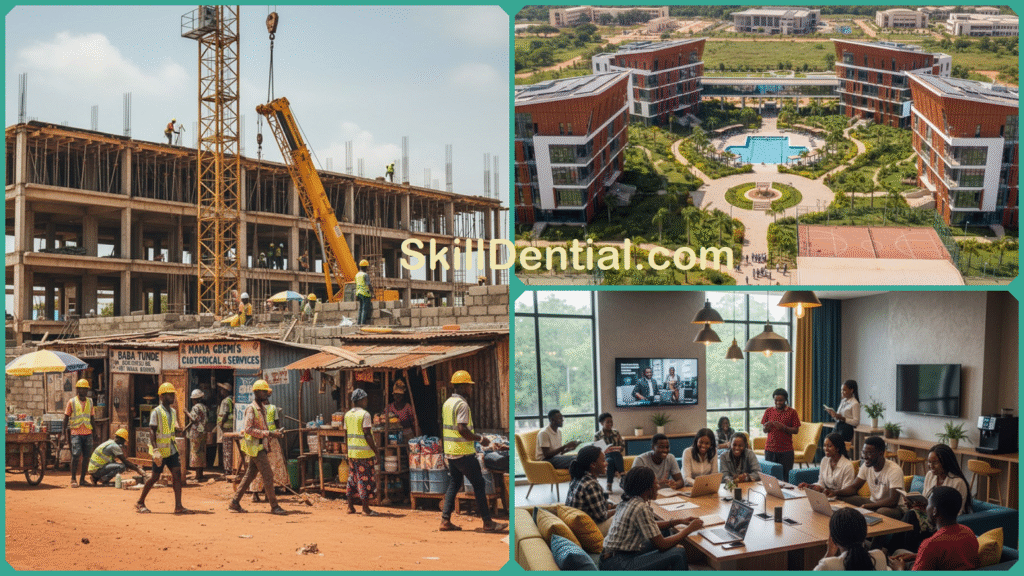When Adeyemi gained admission to the University of Lagos (UNILAG), his parents were understandably thrilled. However, their excitement soon gave way to the all-too-familiar challenge of securing safe, affordable student housing. The campus hostels were fully occupied, and local agents demanded exorbitant rents.
Cramped one-bedroom apartments, originally intended for small families, were being squeezed to accommodate four or more undergraduates. Segun’s father, a civil servant, couldn’t grasp why Student Housing had become such a lucrative market—until he witnessed the desperate throng of parents and students in Yaba, pleading with landlords for any available space.
That moment marked a profound realization: Student Housing, once a mere administrative concern for institutions, has evolved into one of Nigeria’s most resilient and lucrative real estate sectors. The persistent shortage of student accommodation across Nigerian universities poses a significant challenge but also offers an unparalleled opportunity for investors and developers.

With rising student enrollment fueled by demographic growth and greater access to higher education, innovative and well-designed Student Housing Projects have become essential for universities aiming to attract top talent, retain students, and boost local economies.
Amid this massive demand-supply gap (estimated at over 1.5 million bed spaces nationwide), a new wave of transformative student accommodation initiatives is emerging. These underscore the value of models like Public-Private Partnerships (PPP) and Build-Operate-Transfer (BOT).
In this comprehensive deep dive, we thoroughly explore the Top Universities Driving Student Housing Investment in Nigeria. We will reveal the 11 key institutions that are not only leading the way but also generating the highest demand, actively shaping the market dynamics, and clearly demonstrating exactly why savvy and shrewd investors are eagerly rushing to develop properties and infrastructure around these prominent educational hubs.
Fundamental Concepts and Theories in Student Housing Projects
A Student Housing Project is a real estate development designed exclusively to meet the residential needs of university students, combining modern amenities, tailored safety features, and vibrant communal spaces into purpose-built structures.
These projects stand apart from traditional university halls or converted apartments by focusing on the unique patterns and requirements of student life, such as proximity to campus, all-inclusive rent packages, high-speed internet, study areas, social lounges, and 24/7 security measures.
- Public-Private Partnerships (PPP) in student housing are contractual arrangements where a private sector partner invests in, designs, constructs, and may manage student accommodation, while the university provides land or regulatory support, sharing both risks and rewards.
- The Build-Operate-Transfer (BOT) model is a subset where private developers build and operate the facility for a predefined period, generating rental revenue and managing operations during the contract. Once the term ends, ownership and management are transferred to the university at no additional cost.
These innovative models effectively bridge the gaps in financing and expertise, ensuring that projects move forward without unnecessary delays. They play a crucial role in speeding up the delivery process of student accommodation initiatives, allowing developments to reach completion much faster than traditional methods.
Additionally, these models play a crucial and substantial role in raising and consistently maintaining exceptionally high-quality standards, thereby ensuring that the living environments provided for students not only meet but often exceed the set expectations and requirements.
11 Universities Leading Student Housing Innovation
Not all bed spaces are created equal in the world of property investment. For savvy investors looking to maximize their returns, the real opportunity lies specifically with institutions that prioritize and specialize in Purpose-Built Student Accommodation (PBSA), offering tailored living spaces designed to meet the unique needs of students.
Below is a detailed update, with verified examples, highlighting leading Nigerian universities that are actively innovating in the Student Housing Project space. These cases are especially relevant to investors, policymakers, and consultants looking for models of excellence and opportunities aligned with best practices and robust partnerships.
| University | Location | Model/Initiative | Project Highlight/Impact |
|---|---|---|---|
| Lagos State University (LASU) | Lagos | PPP (Advent’s PBSA) | 1,128-bed facility completed; transformed LASU into a semi-residential institution with world-class amenities and eco-friendly features |
| Ahmadu Bello University (ABU), Zaria | Kaduna | Renewed Hope PPP | New 1,600-bed hostel under the federal Renewed Hope Student Housing Programme, soon to be commissioned |
| University of Lagos (UNILAG) | Lagos | Ongoing expansion, PPP pilots | Large-scale hostel upgrades planned, aimed at significantly increasing available bed spaces for over 58,000 students |
| Obafemi Awolowo University (OAU), Ile-Ife | Osun | PPP model | Historic leader in hostel innovation, with new student accommodation projects underway. |
| Covenant University, Ota | Ogun | University-managed, modern design | 8 modern halls featuring en-suite rooms and advanced amenities to set a private sector standard |
| Akwa Ibom State University | Akwa Ibom | Renewed Hope PPP | State-of-the-art 1,600-bed facility nearly completed, part of the Renewed Hope federal scheme |
| Federal Polytechnic, Bauchi | Bauchi | Renewed Hope PPP | Modernized hostels with learning and social spaces, pilot site near completion |
| FCT College of Education, Zuba | Abuja | Renewed Hope PPP | The 1,600-bed project is almost ready and will serve as a reference for other state institutions |
| Sikiru Adetona College of Education, Science and Technology | Ogun | Renewed Hope PPP | New facilities with modern amenities, close to completion |
| College of Education, Warri | Delta | Renewed Hope PPP | The 1,600-bed project is almost ready and will serve as a reference for other state institutions. |
| University of Ibadan (UI) | Oyo | Ongoing hostel expansion | Nigeria’s oldest institution, scaling up supply through institutional and private sector partnerships |
Additional Highlights and Details
LASU – Advent’s PBSA Project: The cutting-edge 1,128-bed hostel at LASU is the product of a landmark PPP led by Advent Integrated Services Limited and Lagos State. It features eco-friendly systems (biodigesters, water management), social/recreational spaces, and enhances LASU’s position as a semi-residential campus—the first of its kind in the university’s history. This project signals a new benchmark for partnership-driven infrastructure delivery and student welfare.
Federal Renewed Hope Student Housing Programme: Backed by Family Homes Funds Limited (FHFL) and TETFund, and targeting 38,400 new bed spaces nationwide, this ongoing initiative leverages PPP models for rapid, sustainable expansion across diverse geographic zones. Pilot projects are already near completion in six flagship tertiary institutions (including ABU, Akwa Ibom State University, and the College of Education, Warri), with more phases scheduled.
These institutions are leading the way in driving student accommodation reform across Nigeria by successfully integrating quality living standards, affordable pricing, and scalable financial models that can be expanded over time. They stand out as powerful and persuasive case studies that attract the attention of both local and international investors who are actively searching for high-impact investment opportunities with significant growth potential and social impact.
Current Trends and Developments of Student Housing in Nigeria
Amid chronic and longstanding shortages, the Nigerian student housing market is currently experiencing its most significant and transformative evolution to date. The major trends driving and reshaping this rapidly changing space revolve primarily around two key factors: the increasing adoption and use of innovative financial models such as Public-Private Partnerships (PPP) to unlock much-needed capital investment, and a strong focus on offering modern amenities—including essentials like 24/7 reliable power supply, enhanced security measures, and high-speed Wi-Fi connectivity—as standard and expected features.
This evolving landscape is precisely where investors are directing their attention and resources, aiming for predictable, sustainable, and high-occupancy returns in this growing market.
Surging Demand and Supply Gap
Nigeria’s tertiary institutions currently accommodate less than 30% of the total number of students who require on-campus student housing, highlighting a significant shortfall in available accommodation. In major urban centers such as Lagos and Ibadan, the shortage is even more pronounced, with accommodation gaps in hostels reaching as high as 80%.
The significant and continuously increasing demand for student housing presents a very strong and highly compelling business case for the development and construction of new accommodation projects specifically designed to address and satisfy these essential and urgent needs.
Public-Private Partnerships Gaining Traction
The recent shift toward Public-Private Partnerships (PPPs) and Build-Operate-Transfer (BOT) structures clearly signals a growing recognition that relying solely on institutional self-funding is no longer adequate or sustainable. For example, the Renewed Hope Student Housing Programme has successfully mobilized billions of dollars through a combination of both government funding and private sector capital.
This initiative currently supports 24 pilot institutions and aims to achieve an ambitious target of creating 38,400 new bed spaces by the end of the upcoming year, significantly expanding student accommodation options nationwide.
Modern Amenities and Student-Centered Design
Universities today are increasingly prioritizing the development and enhancement of various facilities such as ensuite rooms, comfortable reading lounges, well-equipped cafeterias, convenient laundromats, and advanced integrated security systems. These improvements reflect a commitment to meeting global standards for student welfare and promoting academic productivity.
By investing in these upgraded amenities, institutions not only create a more supportive and enjoyable living and learning environment but also encourage higher enrollment rates and contribute significantly to the cultivation of healthy, vibrant campus communities where students can thrive both socially and academically.
Economic and Social Impact
Beyond directly enhancing student welfare, new projects significantly stimulate local economies by creating a wide range of construction jobs that provide employment opportunities for many workers. Additionally, these projects promote the growth of small and medium-sized enterprises (SMEs) such as groceries, cafes, and laundries, which benefit from increased demand and customer bases.
Furthermore, these initiatives generate ongoing, recurring revenue streams not only for the universities involved but also for local governments, contributing to the overall economic vitality and sustainability of the surrounding communities.
Cases of Student Housing Projects in Focus
Here are several standout cases that prominently showcase significant innovation in student housing as well as remarkable investment opportunities within Nigeria:
Advent’s PPP Hostel at LASU
The new 1,128-bed hostel at Lagos State University (LASU) is a trailblazing public-private partnership (PPP) developed by Advent Integrated Services Limited. This project stands out by transforming LASU into a semi-residential campus for the first time since its founding, providing modern, eco-friendly accommodation.
Its design includes biodigesters, water management systems, 24-hour electricity, recreation and social spaces, and robust security—attributes that significantly elevate student welfare and experience while enabling steady, long-term revenue for both the university and private stakeholders.
Renewed Hope Student Housing Programme
The Renewed Hope Student Housing Programme, launched by the Nigerian federal government, is a nationwide initiative targeting 24 pilot tertiary institutions, including 11 universities already recognized for innovation. Backed by Family Homes Funds Limited, TETFund, and a growing consortium of private developers, the scheme emphasizes a PPP approach to rapidly deploy high-quality, affordable hostels, with around 38,400 new bed spaces set for delivery.
Key pilot projects conducted at Ahmadu Bello University (ABU), Akwa Ibom State University, and several other institutions effectively demonstrate the programme’s significant scalable potential as well as its innovative funding structures that are focused on sustainability and long-term impact.
Covenant University: Private Sector Excellence
Covenant University consistently establishes the highest national standards for privately managed student housing across the country. Its student villages are thoughtfully designed with a modern aesthetic, offering en-suite rooms that provide privacy and comfort, complemented by high-speed internet connectivity to support academic and personal needs.
These residential areas also include dedicated recreational and worship spaces, creating a well-rounded living environment. Comprehensive on-site management ensures that residents receive prompt support and maintain a safe, secure atmosphere.
This outstanding student housing model directly contributes to enhanced academic performance and overall student satisfaction, positioning the university as one of the most desirable choices for students and parents who prioritize globally competitive, secure, and well-managed accommodation options.
These cases collectively highlight the significant effectiveness of forming strategic partnerships, utilizing modern financial structuring techniques, and adopting a comprehensive, holistic approach to student welfare. Together, these elements position the student housing project sector to attract ongoing investment and generate sustained value creation well into the future.
This comprehensive and multifaceted strategy guarantees that projects not only address and fulfill immediate needs effectively but also actively promote sustained long-term growth and enduring stability within the entire sector.
Benchmark Best Practices
These 11 universities stand out as prime examples that showcase the best practices and innovative approaches essential for developing successful student housing projects within Nigeria’s rapidly evolving and dynamic higher education landscape:
- Embracing PPPs/BOTs: Each institution actively collaborates with reputable and experienced private partners as well as financial institutions through well-structured Public-Private Partnership (PPP) and Build-Operate-Transfer (BOT) models. These strategic collaborations play a crucial role in effectively bridging funding gaps that often challenge large-scale projects, significantly accelerating project delivery timelines, and ensuring that operations benefit from professional and expert management throughout the lifecycle of the initiative. Such partnerships not only enhance resource mobilization but also promote sustainable development and operational efficiency.
- Prioritizing Quality: Student-centric designs are given the highest priority, ensuring that facilities include spacious ensuite rooms for comfort and privacy, as well as modern study areas equipped with the latest technology to support academic success. In addition to these, social spaces are thoughtfully designed to foster community and interaction among students. Reliable utilities are guaranteed to provide uninterrupted access to essential services, while robust safety systems are implemented to create a secure living environment. All these features work together seamlessly to cater comprehensively to both the academic and personal needs of students, enhancing their overall experience.
- Ensuring Sustainability: These projects carefully balance affordability for both students and parents while incorporating sound and effective revenue models that support long-term financial viability. This approach enables continuous reinvestment into the programs and ensures proper maintenance of facilities over time without compromising accessibility or creating barriers to entry. By maintaining this delicate balance, the projects promote sustainable growth and ongoing availability for future generations.
- Strengthening Governance: Universities actively uphold transparent, efficient, and highly accountable hostel administration practices, which are absolutely crucial for sustaining long-term operational excellence. This approach not only helps in building and maintaining strong investor confidence but also plays a vital role in ensuring a consistently positive and enriching experience for students throughout their stay. By prioritizing these governance principles, universities create a well-structured environment that supports both institutional growth and student satisfaction.
By implementing these carefully designed strategic benchmarks, these universities provide enduring and reliable blueprints that serve as models for scalable, investable, and socially impactful student accommodation solutions throughout Nigeria.
These frameworks not only tackle the immediate and pressing student housing challenges faced by students today but also establish long-lasting, sustainable opportunities for continuous growth and meaningful positive social change. They play a crucial role in fostering a supportive and inclusive environment within the student community across the entire nation, helping to improve living conditions and promote overall well-being for current and future generations.
FAQs
What is a Student Housing Project?
A Student Housing Project involves the development of purpose-built residential accommodation for university or college students, typically situated on or near campus, and designed with essential facilities and security in mind to support students’ academic and personal needs.
How are these projects typically funded?
Most successful student accommodation projects leverage a mix of Public-Private Partnership (PPP) or Build-Operate-Transfer (BOT) models, blending government backing, the use of institutional land, and the injection of private sector capital to create scalable and sustainable housing solutions.
Why is student housing investment becoming so attractive?
Increasing student enrolment and a persistent shortage of formal accommodation drive constant demand; well-designed and professionally managed student housing projects typically yield steady rental income and maintain low vacancy rates, which are highly attractive traits for institutional and private investors.
What are the main risks for investors?
Risks include regulatory complexities, construction cost overruns, and poorly aligned or inexperienced project partners. These can be reduced by working closely with reputable local developers, thoroughly understanding market conditions, and conducting robust due diligence.
Do these improved hostels really impact student outcomes?
Access to quality, secure, and well-managed accommodation has a direct positive impact on students’ academic focus, health, campus engagement, and graduation rates, while also raising the profile and competitiveness of the university itself.
In Conclusion
Nigeria’s Student Housing Project ecosystem offers a compelling investment and social-impact opportunity as these 11 pioneering universities demonstrate. The era of overcrowded, inadequate hostels is giving way to world-class living-and-learning environments, thanks to PPPs, BOTs, and a commitment to student-centered design.
For real estate investors, financial institutions, university leaders, and researchers, the trends and success stories outlined here form a high-quality roadmap for further engagement. As these initiatives scale, expect enhanced student experiences, stronger universities, and vibrant local economies.
Stakeholders should prioritize continuous partnership building and invest in due diligence, focusing on scalable PPP/BOT models. Universities must maintain high standards of transparency and governance, while investors should track demographic and regulatory trends to optimize entry strategies.
By shedding detailed light on the leading figures and key innovators in the student accommodation sector, this post strategically positions you to take informed action within Nigeria’s rapidly evolving education and real estate landscape—effectively driving both significant social value and sustainable business success in equal measure.
Discover more from SkillDential
Subscribe to get the latest posts sent to your email.


